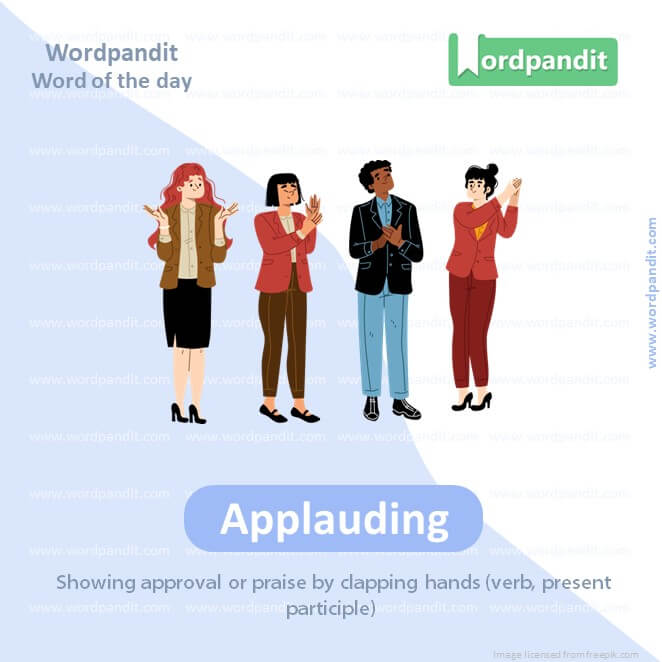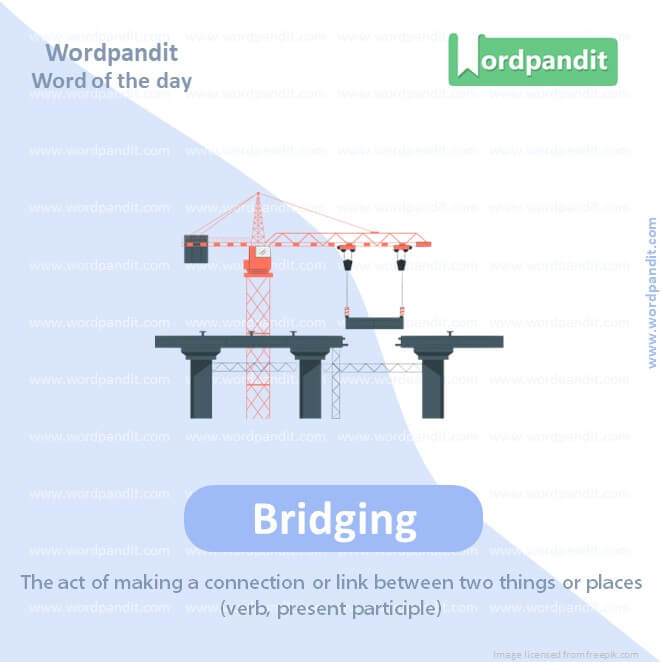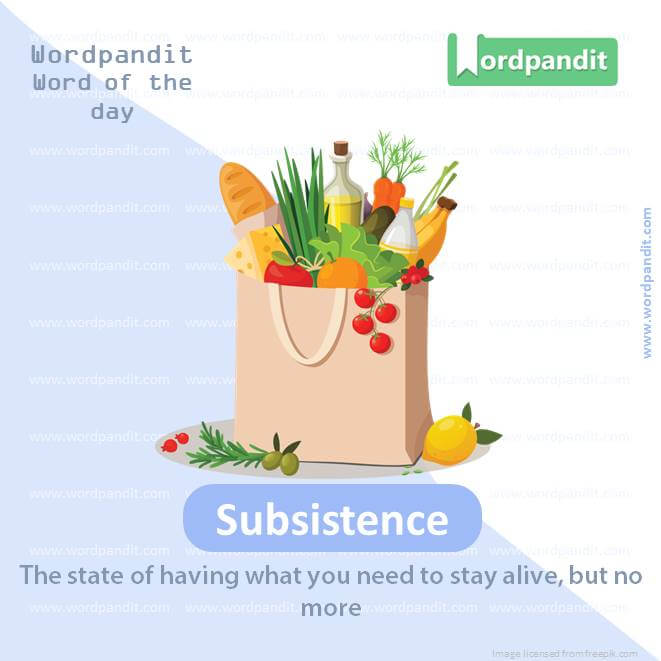Daily Vocabulary Words: Enhance Your Lexicon with Leading Newspapers & Publications
Welcome to the Daily Vocabulary section at Wordpandit!
Our mission is straightforward: to bring you essential vocabulary words featured in top newspapers and publications worldwide. By focusing on words you’ll encounter in renowned sources, we aim to help you enhance your vocabulary effectively and practically.
Our selection includes words from:
– The New York Times
– The Washington Post
– Scientific American
– BBC
– The Guardian
– Psychology Today
– Wall Street Journal
– The Economist
– The Hindu
– The Times of India
– The Economic Times
– Hindustan Times
– Live Mint
– The Indian Express
– And many more.
We are committed to your vocabulary development. Simply visit this section regularly and explore the daily posts. This is your go-to repository for commonly used words, providing significant practical benefits by familiarizing you with vocabulary from the leading publications listed above.
Make it a habit to visit our website daily and expand your lexicon with words from top newspapers and publications.

WORD-1: APPLAUDING
CONTEXT: Most importantly, he took India to the high table of global governance, with every country applauding and respecting his leadership and India’s global role.
SOURCE: Indian Express
EXPLANATORY PARAGRAPH: Imagine you did a really great job building a tall tower with your blocks, and everyone around starts clapping their hands for you. That clapping to show they are happy and proud of what you did is called “applauding.”
MEANING: Showing approval or praise by clapping hands (verb, present participle)
PRONUNCIATION: uh-PLAW-ding
SYNONYMS: Cheering, clapping, acclaiming, praising, lauding, commending
USAGE EXAMPLE:
1. Everyone started applauding after the little girl finished singing her song.
2. The audience was applauding loudly at the end of the play.
3. His speech was so inspiring that it was met with applauding from all around.
4. She was applauding excitedly when her friend won the award.
WORD-2: ENTANGLEMENT
CONTEXT: Such leverage will make that country vulnerable to greater debt entanglement.
SOURCE: Hindustan Times
EXPLANATORY PARAGRAPH: Think about a time when your shoelaces got all tied up together, and it was hard to untie them. This mixed-up mess is like “entanglement,” where things are twisted or connected in a complicated way.
MEANING: A situation or condition of being deeply involved or caught up in something complex (noun).
PRONUNCIATION: en-TANG-guhl-ment
SYNONYMS: Complication, involvement, mess, snarl, confusion, tangle
USAGE EXAMPLE:
1. The story was full of mystery and entanglement between the characters.
2. They found themselves in an entanglement that was hard to resolve.
3. His entanglement in the scheme caused him a lot of trouble.
4. The ropes were in such an entanglement that it took hours to separate them.

WORD-3: BRIDGING
CONTEXT: The military leadership has also shown keen interest in bridging the relationship with the US, laying the ground for the civilian government to further promote defense and economic cooperation.
SOURCE: Hindustan Times
EXPLANATORY PARAGRAPH: Imagine you have two toy castles, and you build a little bridge to connect them so that the toy people can go from one castle to the other. “Bridging” is when you make a connection or a link between two things.
MEANING: The act of making a connection or link between two things or places (verb, present participle)
PRONUNCIATION: BRIJ-ing
SYNONYMS: Connecting, linking, joining, spanning, coupling, uniting
USAGE EXAMPLE:
1. Bridging the gap between two communities is important for understanding.
2. They were working on bridging old traditions with new ideas.
3. The project focused on bridging the differences between the two groups.
4. A new bridge is bridging the river, making travel easier.

WORD-4: SUBSISTENCE
CONTEXT: Samuel Johnson, a profound literary critic and essayist, wrote, “Poverty is a great enemy to human happiness; it certainly destroys liberty, and it makes some virtues impracticable, and others extremely difficult.” In sharp contrast, conventional measures of poverty in terms of income are limited and narrowly focused on scarcity of resources to eke out a bare subsistence. But there is much more to poverty than a bare subsistence, as emphasised by Johnson and others.
SOURCE: The Hindu
EXPLANATORY PARAGRAPH: Subsistence is like just having enough to eat so you don’t feel hungry, but not having any extra. It means having only what you need to survive and nothing more.
MEANING: The state of having what you need to stay alive, but no more.
PRONUNCIATION: suhb-SIS-tuhns
SYNONYMS: Survival, sustenance, existence, nourishment, maintenance, support
USAGE EXAMPLES:
1. The family lived on subsistence farming, growing just enough food to eat.
2. The aid was intended to help people meet their subsistence needs.
3. They struggled to maintain subsistence with limited resources.
4. Subsistence means barely getting by without extra comforts.
WORD-5: PREDETERMINING
CONTEXT: Elections in Pakistan have mostly been a sham, with the country’s military accused of predetermining the outcome, while in Sri Lanka, a divided polity haunts the presidential election due in the second half of the year.
SOURCE: Indian Express
EXPLANATORY PARAGRAPH: Think about deciding before you even start playing a game that you will be the leader, and everyone else will follow what you say. “Predetermining” is when you make a decision or a plan about something before it happens.
MEANING: The act of deciding or establishing an outcome in advance (verb).
PRONUNCIATION: pree-dee-TUR-min-ing
SYNONYMS: Prearranging, predeciding, presetting, preplanning, fixing, setting
USAGE EXAMPLE:
1. The rules were predetermining the winner even before the game started.
2. Their strategy involved predetermining every step of the process.
3. He was accused of predetermining the results of the competition.
4. The outcome was not random; it was predetermining by earlier choices.
WORD-6: PAROCHIAL
CONTEXT: Modi successfully roused among the citizens of Bharat a sense of their distinct identity as a cultural and civilisational nation that could subsume all the narrow and parochial identities of caste, language, region, and religion.
SOURCE: Indian Express
EXPLANATORY PARAGRAPH: Imagine thinking that the only good playground is the one right by your house, and not knowing about all the other fun playgrounds in different places. “Parochial” means thinking in a small or narrow way, just about your own little area or group.
MEANING: Relating to or having a limited or narrow outlook or scope (adjective).
PRONUNCIATION: puh-ROH-kee-uhl
SYNONYMS: Narrow-minded, provincial, insular, narrow, limited, small-minded
USAGE EXAMPLE:
1. His parochial view prevented him from understanding other cultures.
2. They criticized the parochial approach of the local government.
3. The discussion was criticized for being too parochial and not considering wider issues.
4. Her parochial attitude was evident when she dismissed the new ideas.
WORD-7: METROPOLISES
CONTEXT: His cricketing career is not just a benchmark of success and excellence, but stands as a testament to his character, marked by humility and self-effacing grace, and is a symbol of hope for millions across India where cricketers once rose only from the major metropolises.
SOURCE: Indian Express
EXPLANATORY PARAGRAPH: Imagine a very big city with lots of buildings, people, cars, shops, and things to do. This big city is called a “metropolis.” When we talk about many such big cities, we use the word “metropolises.”
MEANING: Large and important cities, typically major cultural, economic, and political centers (noun, plural).
PRONUNCIATION: meh-TROP-uh-luh-sees
SYNONYMS: Cities, capitals, megacities, urban centers, cosmopolises, hubs
USAGE EXAMPLE:
1. The family traveled to various metropolises during their vacation.
2. Each of these metropolises has its own unique culture and attractions.
3. Metropolises around the world are facing similar urban challenges.
4. The conference attracted mayors from several major metropolises.

WORD-8: HOUNDING
CONTEXT: The current establishment is hounding the former president with a bunch of criminal cases.
SOURCE: Indian Express
EXPLANATORY PARAGRAPH: Imagine a dog that keeps following a scent and won’t stop until it finds what it’s looking for. “Hounding” is like that, but it means someone keeps bothering or chasing someone else over and over.
MEANING: Persistently chasing, bothering, or harassing someone (verb)
PRONUNCIATION: HOWN-ding
SYNONYMS: Harassing, pestering, badgering, nagging, pursuing, bothering
USAGE EXAMPLE:
1. The reporters were hounding the celebrity for an interview.
2. He regretted hounding her for a response to his question.
3. The debt collectors were hounding him day and night.
4. She felt like she was being hounded by her responsibilities.
WORD-9: RENUNCIATION
CONTEXT: It was handpicked by the company’s founders for its lively ring and ease in renunciation.
SOURCE: Times of India
EXPLANATORY PARAGRAPH: Imagine deciding you don’t want to play with a certain toy anymore and telling everyone you’re going to give it up. “Renunciation” is when someone decides to give up something like a habit or a claim because they don’t want it anymore.
MEANING: The formal rejection or giving up of something, typically a claim, right, or possession (noun).
PRONUNCIATION: reh-nuhn-see-AY-shun
SYNONYMS: Rejection, abandonment, relinquishment, abdication, surrender, refusal
USAGE EXAMPLE:
1. His renunciation of the throne shocked the entire kingdom.
2. She made a public renunciation of her earlier statements.
3. The contract included a clause for the renunciation of any future legal claims.
4. The renunciation of his old habits marked a new beginning for him.

WORD-10: RETALIATING
CONTEXT: The Opposition accuses the government of weaponizing law to keep the popular former president off the ballot and is retaliating by preparing to impeach the president.
SOURCE: Indian Express
EXPLANATORY PARAGRAPH: Imagine if someone took your toy and you took one of theirs to get back at them. “Retaliating” is when someone does something mean or hurtful back to someone else because they were hurt first.
MEANING: Acting in return against someone, typically for a wrong suffered (verb).
PRONUNCIATION: re-TAL-ee-ay-ting
SYNONYMS: Avenging, revenging, reciprocating, counterattacking, responding, replying
USAGE EXAMPLE:
1. He was suspended from school for retaliating against the bully.
2. After the attack, the group considered retaliating.
3. She regretted retaliating in anger during the argument.
4. Retaliating in such a manner only escalated the conflict.
Vocabulary Daily
Language learning is a beautiful yet complex dance, where ‘vocabulary daily’ connote the integral beats. These everyday words form the essence of most of our conversations and are the cornerstone of effective communication. However, a methodical approach is required to efficiently learn ‘vocabulary daily’.
One key approach to learning ‘vocabulary daily’ is consistency. Engaging with a few words every day consistently fosters better understanding and recall than sporadic cramming sessions.
Interactive tools can add a touch of excitement and ease to mastering ‘vocabulary daily’. Flashcards, word of the day calendars, language learning apps can make the learning experience fun and fruitful. These tools not only introduce new words but often provide a context of use, aiding your understanding.
Making ‘vocabulary daily’ a part of your daily life is a surefire success strategy. Incorporating these words into day-to-day conversations, writing, or social media interactions greatly enhances retention and usage. It also allows you to witness firsthand the impact of a rich vocabulary on the clarity of expression.
To effectively grasp ‘vocabulary daily’, always keep a learner’s curiosity. Explore books, news articles, music, and podcasts in the respective language. This exposure helps in absorbing the words in a real-world context, thus building a robust bond with ‘vocabulary daily’.
In conclusion, understanding ‘vocabulary daily’ is an ongoing process that necessitates consistency, interactive learning, practical application, and a learner’s curiosity. By following this comprehensive approach, the task of mastering ‘vocabulary daily’ becomes less of a chore and more of an enriching journey that can lead to eloquent and effective communication. So, step into the exciting world of ‘vocabulary daily’ and let it colour your language learning adventure with shades of clarity, confidence, and joy.











